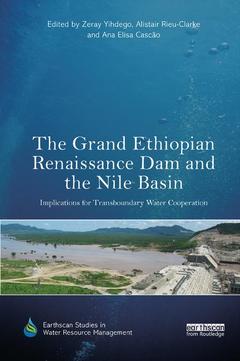The Grand Ethiopian Renaissance Dam and the Nile Basin Implications for Transboundary Water Cooperation Earthscan Studies in Water Resource Management Series
Coordonnateurs : Yihdego Zeray, Rieu-Clarke Alistair, Cascão Ana Elisa

The Grand Ethiopian Renaissance Dam (GERD) will not only be Africa?s largest dam, but it is also essential for future cooperation and development in the Nile River Basin and East African region. This book, after setting out basin-level legal and policy successes and failures of managing and sharing Nile waters, articulates the opportunities and challenges surrounding the GERD through multiple disciplinary lenses.
It sets out its possibilities as a basis for a new era of cooperation, its regional and global implications, the benefits of cooperation and coordination in dam filling, and the need for participatory and transparent decision making. By applying law, political science and hydrology to sharing water resources in general and to large-scale dam building, filling and operating in particular, it offers concrete qualitative and quantitative options that are essential to promote cooperation and coordination in utilising and preserving Nile waters. The book incorporates the economic dimension and draws on recent developments including: the signing of a legally binding contract by Egypt, Ethiopia and Sudan to carry out an impact assessment study; the possibility that the GERD might be partially operational very soon, the completion of transmission lines from GERD to Addis Ababa; and the announcement of Sudan to commence construction of transmission lines from GERD to its main cities. The implications of these are assessed and lessons learned for transboundary water cooperation and conflict management.
1. A Multi-disciplinary Analysis of the Risks and Opportunities of the Grand Ethiopian Renaissance Dam for Wider Cooperation in the Nile 2.The Nile Basin Cooperative Framework Agreement: Disentangling the Gordian Knot? 3.Agreement on Declaration of Principles on the GERD: Levelling the Nile Basin Playing Fields? 4.International Law developments on the Sharing of Blue Nile Waters: a fairness perspective 5.Changing cooperation dynamics in the Nile Basin and the role of the GERD 6. GERD and hydropolitics in the Eastern Nile: from water to benefit sharing? 7. Analyzing the Economy-Wide Impacts on Egypt of Alternative GERD Filling Policies 8. Economic Impact Assessment of the Grand Ethiopian Renaissance Dam Under Different Climate and Hydrological Conditions 9. From Projecting Hydroclimate Variability to Filling the GERD: Upstream Hydropower Generation and Downstream Releases 10. Managing risks while filling the Grand Ethiopian Renaissance Dam
Zeray Yihdego is a Reader in International Law at the University of Aberdeen, UK.
Alistair Rieu-Clarke is a Professor of Law at the University of Northumbria, UK.
Ana Elisa Cascão is currently an Independent Researcher/Consultant, and until recently was a Programme Manager at Stockholm International Water Institute, Sweden.
Date de parution : 07-2019
15.6x23.4 cm
Date de parution : 10-2017
15.6x23.4 cm
Thèmes de The Grand Ethiopian Renaissance Dam and the Nile Basin :
Mots-clés :
Nile Basin; Alan Nicol; Blue Nile; Alistair Rieu-Clarke; Eastern Nile; Ana Elisa Cascão; Eastern Nile Countries; South Sudan; Brent Boehlert; Eastern Nile Basin; Egypt; Nile Waters; Ethiopia; NBI; Ines Dombrowsky; Nile Riparians; Kenneth M; Strzepek; Watercourses Convention; Kevin G; Wheeler; Nile Basin Countries; Onno Kuik; CGE Model; Paul Block; CFA; Pieter van der Zaag; Upstream Riparians; Rawia Tawfik; GERD Project; Roy Brouwer; Real Gdp; Salman M.A; Salman; Nile Basin States; Sherman Robinson; Downstream Riparians; Solomon Tassew Erkyihun; Reasonable Utilisation; Sudan; Downstream Releases; Tewodros Negash Kahsay; Blue Nile River; Ying Zhang; Downstream Countries; Hydropower Generation; Blue Nile Basin; International Water Law



